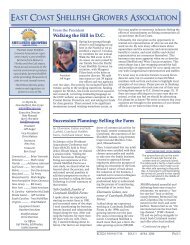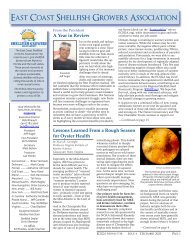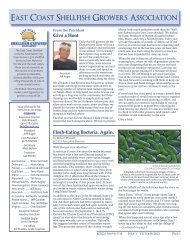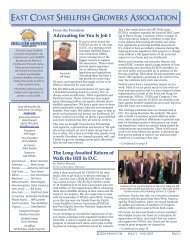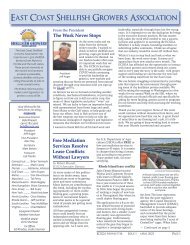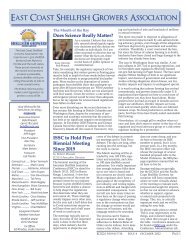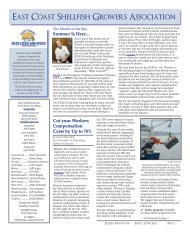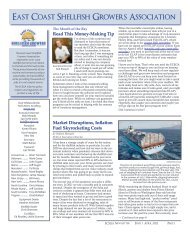ECSGA October 2022 Newsletter
This issue contains articles on social license for aquaculture, cultural benefits and social impacts of shellfish aquaculture, how best management practices differ from laws and regulations, mortality rates in floating gear vs. bottom gear, the story of how the Oceanfarmr (formerly known as SmartOysters) app came to be, and the difference between gross sales and net profit,
This issue contains articles on social license for aquaculture, cultural benefits and social impacts of shellfish aquaculture, how best management practices differ from laws and regulations, mortality rates in floating gear vs. bottom gear, the story of how the Oceanfarmr (formerly known as SmartOysters) app came to be, and the difference between gross sales and net profit,
Create successful ePaper yourself
Turn your PDF publications into a flip-book with our unique Google optimized e-Paper software.
— Continued from page 5<br />
Best Practices<br />
ment officers. Since industry members are<br />
often more abundant than enforcement officers<br />
(and more aware of each other’s actions)<br />
it is often the case that self-regulation is quite<br />
an effective way to achieve compliance.<br />
However, not all individuals are going to be<br />
swayed by peer pressure; some may fear that<br />
confrontation with other industry members<br />
will lead to recriminations and potential<br />
backlash. Some mature industry groups<br />
have gone so far as to establish standards<br />
for operations (sometimes called “Codes of<br />
Practice”) and have enlisted third-party audits<br />
and an industry certification process that<br />
WORLD´S LEADING OUTBOARD DIESEL ENGINES<br />
ENDURANCE • RELIABILITY • POWER • CONTROL<br />
125 HP - 300 HP FOR DEMANDING ENVIRONMENTS<br />
mackboring.com • (908) 391-8378 • kthompson@mackboring.com<br />
they hope will lead to increased customer<br />
confidence, and in some cases could result in<br />
the loss of licenses or permits.<br />
Often, regulations allow shellfish farmers to<br />
do things that may not be in the best interest<br />
of the larger community. An example is the<br />
Right to Farm Law, which in many states<br />
allows farmers to make noise or generate offensive<br />
odors as long as they are conducting<br />
a “normal farming practice.” Just because<br />
it’s allowed by law doesn’t mean it’s a good<br />
idea for shellfish farmers to go out at dawn<br />
and run loud pumps or leave rotting shellfish<br />
out in the sun. Such activities would alienate<br />
the public and could make it harder for future<br />
farmers to acquire leases. Activities may<br />
technically be allowed under the law, but in<br />
practice they might not be prudent.<br />
Advocates and Counselors Representing<br />
Shellfish Growers Since 1999<br />
SAMUEL W. “BILLY” PLAUCHÉ<br />
billy@plauchecarr.com<br />
MEGAN K. TERRELL<br />
megan@plauchecarr.com<br />
www.plauchecarr.com<br />
Pacific Northwest Office<br />
1218 3rd Ave., Ste. 2000<br />
Seattle, WA 98101<br />
206.588.4188<br />
Gulf Coast Office<br />
1110 River Rd. S., Ste. 200<br />
Baton Rouge, LA 70802<br />
225.256.0649<br />
Aquaculture farmers operate in the commons<br />
and are granted the privilege of leasing<br />
grounds for farming when it suits the state.<br />
Most states are bound by their constitutions<br />
to manage tidal lands for the benefit of the<br />
sovereign (the people of the state). States<br />
make a public-interest determination that<br />
weighs the costs and benefits of the many<br />
uses of these waters, including commercial<br />
and recreational fishing, boating and navigation,<br />
mooring fields, marinas and often<br />
wastewater treatment plant discharge. States<br />
try to balance these many different uses in an<br />
equitable fashion that maximizes the benefit<br />
to the sovereign. If growers abuse the privileges<br />
afforded by leasing the commons, the<br />
state can revoke that privilege.<br />
Best Practices are often better tools<br />
than regulations<br />
Aquaculture practices are diverse and<br />
rapidly evolving. It is beneficial to be able<br />
to guide the industry with broad aims and<br />
goals, rather than with specific regulations<br />
that may not apply to future scenarios or<br />
that may hamper the development of novel<br />
approaches that solve problems in unique<br />
and unforeseen ways. It is incredibly hard to<br />
devise regulations that are nimble and adaptable.<br />
Laws usually take years to change and<br />
can often hamstring the ability to alter regulations<br />
to accommodate new innovations.<br />
Industry best practices can be crafted in such<br />
a way as to incentivize continual improvement,<br />
which allows growers to experiment<br />
and develop novel solutions to prickly<br />
problems. The Maine Aquaculture Association<br />
used such a mechanism to develop novel<br />
means to reduce salmon escapes, and to deal<br />
with diseases. These adaptive best practices<br />
eventually led to zero escapes<br />
and zero use of antibiotics at<br />
Maine salmon farms over the<br />
past two decades.<br />
SHELLFISH GROWER<br />
INSURANCE<br />
Call for Commercial Boat Insurance!<br />
General Liability<br />
Jones Act<br />
Business Auto/Truck<br />
Workers’ Compensation<br />
Marine/Boat<br />
All Others<br />
CONNECT WITH<br />
David Merriman, CPCU<br />
Sales Executive<br />
Phone: 434-327-1643<br />
dmerriman@bankersinsurance.net<br />
www.bankersinsurance.net/seafood<br />
Bankers Insurance focuses on you, the client,<br />
and endeavors to become your trusted<br />
insurance agent. We are committed to No<br />
Excuse Client Service and pride ourselves on<br />
delivering the highest ethical and professional<br />
standards. Contact David, today!<br />
Our industry is dynamic<br />
I started growing oysters in the<br />
1980s when we were just getting<br />
access to vinyl-coated wire<br />
and plastic mesh bags, which<br />
allowed us to grow shellfish in<br />
cages, avoiding massive losses<br />
to predators. Thirty years later<br />
the floating OysterGro® cage<br />
was developed. Now we have<br />
SEAPA oyster baskets, Hexcyl<br />
baskets, and the FlipFarm®<br />
system. These methods of<br />
growing were not even on the<br />
drawing board just 15 years ago.<br />
Now that we have to adapt to<br />
a changing climate, new predators<br />
and diseases, increasing<br />
storm intensity and a tripling in<br />
significant 6-inch rainfall events,<br />
I don’t think we can accurately<br />
predict the next innovations in<br />
shellfish farming. The pace of<br />
change is staggering.<br />
— Continued on page 11<br />
Page 6<br />
<strong>ECSGA</strong> <strong>Newsletter</strong><br />
Issue 3 <strong>October</strong> <strong>2022</strong>




